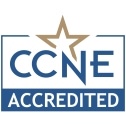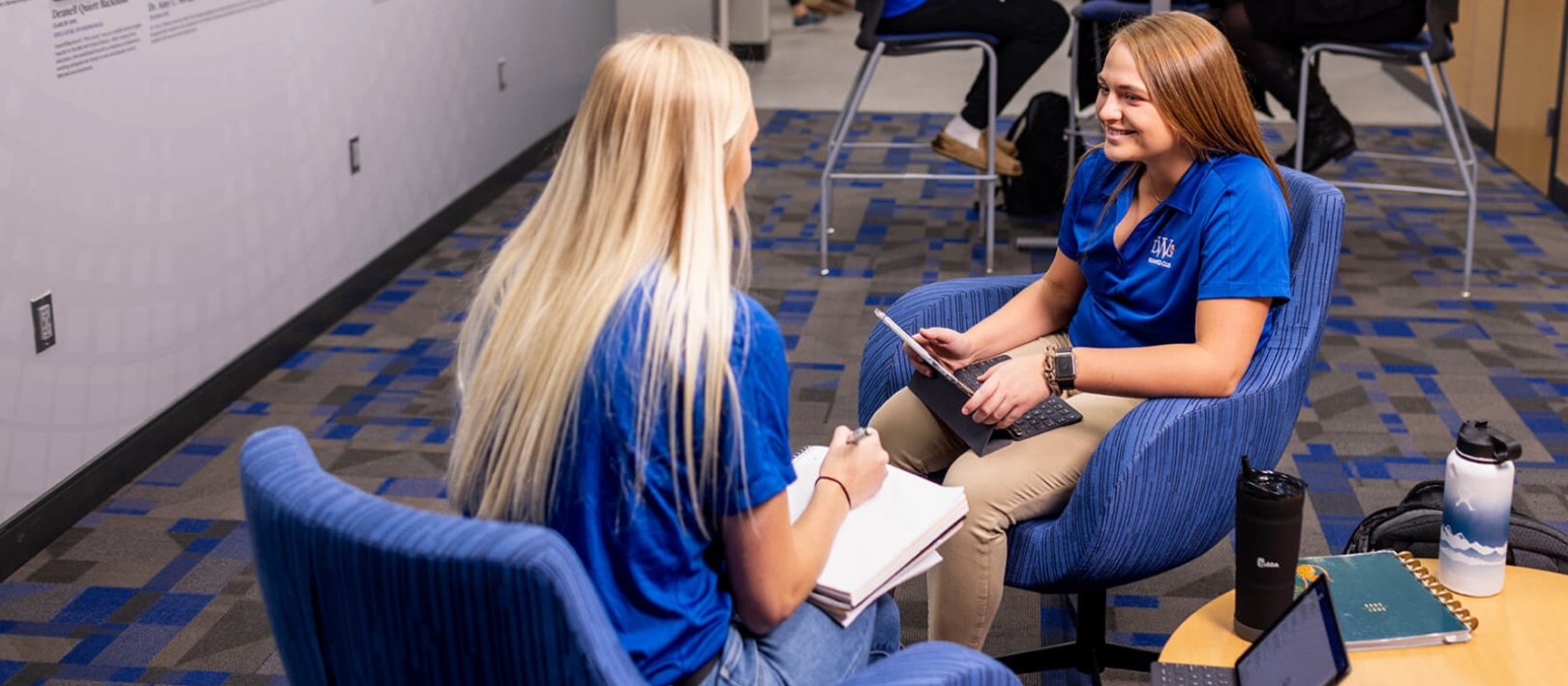Nursing
It’s More Than a Job
What kinds of jobs and specialties await
you when you earn your nursing degree?
A degree in nursing will prepare you for a variety of professional career paths, such as:
Hospital registered nurse
Clinical nurse
Nurse manager
Nursing director
Nurse educator
Clinical research nurse
Public health nurse
Quality assurance or improvement coordinator
Case manager
What’s the Difference at DWU?
- You’ll graduate with a Bachelor of Science degree in Nursing (BSN) and be better prepared to serve patients, enjoy more employment opportunities, career advancements, and higher pay.
- Find a job that matches your passion. DWU holds a 100% job placement rate for nursing graduates.
- Spend your class time learning in the Glenda K. Corrigan Health Sciences Center with four high-tech simulation labs.
- With DWU clinical partnerships, you’ll gain experience in hospitals, nursing homes, clinics, community agencies and others.
- DWU nursing graduates have a high pass rate with the National Council of State Boards of Nursing Licensing Exam for Registered Nurses (NCLEX-RN). After you graduate, you will be eligible and ready for the exam.
Accreditation

The Arlene Gates Department of Nursing at Dakota Wesleyan University prepares students for meaningful careers in professional nursing in a liberal arts setting. The baccalaureate program at Dakota Wesleyan University is accredited by the Commission on Collegiate Nursing Education (CCNE), 655 K Street NW, Suite 750, Washington, DC 20001, 202-887-6791. The Dakota Wesleyan University B.S. Nursing program has been granted full approval status by the South Dakota Board of Nursing, 4305 S. Louise Ave., Suite 201, Sioux Falls, SD 57106-3115, 605-362-2760.
Nursing Courses
Your nursing classes will take you from the classroom to the simulation lab to the clinical site.
Refer to our handy Curriculum Plan to envision
what your semesters might look like.
NUR 320 Fundamental Nursing Concepts II
In addition, the Mitchell Campus must take NUR 310.
NUR 218 Introduction to Professional Nursing Concepts
NUR 310 Fundamental Nursing Concepts I
NUR 115 Basic Patient Care
NUR 110 Medical Terminology
NUR 450 Transition to Professional Practice
NUR 440 Nursing Concepts in Research
NUR 426 Nursing Concepts in Population Health
NUR 418 Concepts in Nursing Management
NUR 423 Complex Nursing Concepts
NUR 412 Lifespan Nursing Concepts II
NUR 411 Lifespan Nursing Concepts I
NUR 408 Advanced Nursing Concepts
NUR 342 Mental & Social Health Nursing Concepts
NUR 332 Nutrition Concepts in Health and Illness
NUR 326 Nursing Concepts in Pharmacology
NUR 321 Health Assessment Nursing Concepts
NUR 318 Concepts in Nursing Leadership
NUR 316 Nursing Concepts in Pathophysiology
Get to Know Your Professors
Our caring and compassionate faculty and staff will guide you through your education right up to the day you participate in your pinning ceremony, one of the most meaningful days to
a new nurse.
Angela Klumb, B.S.N., RN
Paige Gau, M.S.N., RN, CPN
Penny Tilton, DNP, M.S.N., RN
Sarah Raml, M.A., RN
Stacey Patzlaff, M.S.N., RN, OCN
Clinical Experiences
Gain clinical experience in a variety of settings, including hospitals, nursing homes, and other community agencies. You may have the opportunity to work some clinical hours in a rural setting.
Avera Achieve Sponsorship Program
Through the Avera Achieve Sponsorship Program, you will have the opportunity to apply for a special scholarship and career placement opportunity.
Avera will support selected sophomore DWU nursing students with $20,000 in education funding for their junior and senior years as long as they successfully complete their studies and commit to working as nurses at Avera for three years following graduation.
Nursing Mission Statement, Vision and Core Values
Arlene Gates Department of Nursing Mission Statement
The Arlene Gates Department of Nursing, as an integral part of Dakota Wesleyan University, is aligned with its mission, vision, values, and philosophy. The nursing department aspires to prepare students for meaningful careers in professional nursing within a liberal arts setting. The nursing department aspires to cultivate a challenging learning environment based on Christian values and acceptance of diversity. The faculty foster lifelong learning, professional development, and responsibility to service.
Arlene Gates Department of Nursing Vision
The Vision of the Arlene Gates Department of Nursing is to strategically develop and grow DWU nursing programs to further the practice of professional nursing throughout the region.
Arlene Gates Department of Nursing Core Values
The Mission, Vision and Philosophy of the Arlene Gates Department of Nursing are carried out with guidance from AACN’s Core Competencies for Professional Nursing Education (AACN, 2019). The core values for nursing are human dignity, integrity, autonomy, altruism, and social justice.
Program Learning Outcomes
The Program Learning Outcomes are supported by AACN’s The Essentials: Core Competencies for Professional Nursing Education (AACN, 2019). Based on ten domains that represent the essence of professional nursing practice and expected competencies for each domain, four spheres of care are articulated. The domains, competencies and spheres of care lend a uniqueness to the profession of nursing, and diversity to practice (AACN, 2019) while providing a guide for the nursing curriculum toward outcomes-based learning.
The four spheres of care are:
- disease prevention/promotion of health and wellbeing
- chronic disease care
- regenerative or restorative care
- hospice/palliative/supportive care across the lifespan
The domains and competencies allow the learner to build knowledge, skills, and abilities for entry into professional practice. The Essentials also features eight overarching concepts which are fundamental to professional nursing practice and are integrated within and across the domains and competencies. The Essentials serve as a guide for the DWU nursing programs’ program learning outcomes.
The Program Learning Outcomes are as follows:
- Teach graduates to independently provide culturally sensitive, competent nursing care in a variety of settings guided by a scientific concept-based curriculum and professional accountability.
- Develop graduates who incorporate critical thinking and clinical judgement in the provision of holistic, evidence-based nursing care of clients throughout the lifespan.
- Support graduates in the planning and providing of person-centered, coordinated nursing care that contributes to safe and high-quality care outcomes.
- Facilitate graduates who communicate and collaborate with inter-professional teams, utilize health information technology, incorporate cost-effectiveness, and utilize educational principles to promote wellness and well-being.
- Motivate graduates to be committed to lifelong learning and service, display leadership, and who participate in scholarships that advance the profession of nursing.
- Produce graduates who exhibit caring behaviors and who uphold moral ethical and ethical competence in the practice of nursing.
Program Goals
- The programs’ three year mean for NCLEX-RN pass rates will be at or above the minimum standard of 80% required by the nursing programs’ accrediting body (CCNE) Collegiate Commission on Nursing Education.
- The programs’ three year mean for NCLEX-RN pass rates will be above the minimum standard of 75% required by the programs’ licensing body the (SDBON) South Dakota Board of Nursing.
- Seventy percent (70%) of students admitted into the B.S. Nursing program will graduate within five years through achievement of one of the CCNE standards found in standard IV-B.
- Ninety percent (90%) of graduates who are actively seeking employment in nursing will be employed as a practicing registered nurse at six to twelve months post-graduation.
- At six to twelve months post-graduation all items on the graduate survey will receive a mean of 3.0 or higher.
Complete your FAFSA Online
Complete your FAFSA online to begin the financial aid process and to determine the various types of aid you may qualify for to help finance your education. Dakota Wesleyan University’s code for the Free Application for Federal Student Aid (FAFSA) is 003461.
Related Majors & Minors
Allied Health
Be ready for the positions that comprise over half the jobs in healthcare today, such as medical technologist, occupational therapist or physical therapist.
Athletic Training
An exciting career in sports healthcare and rehabilitation, using hands-on learning experiences, is waiting for you in our Master’s in Athletic Training program.
Biology
Sequence DNA, or discover a new spider species. Study biology with professors with backgrounds spanning from plant ecology to human immune systems.
General Science
Study the wonders of biological and physical sciences.
Pre-Med
Pursuing a degree in medicine or another health profession after Dakota Wesleyan?














